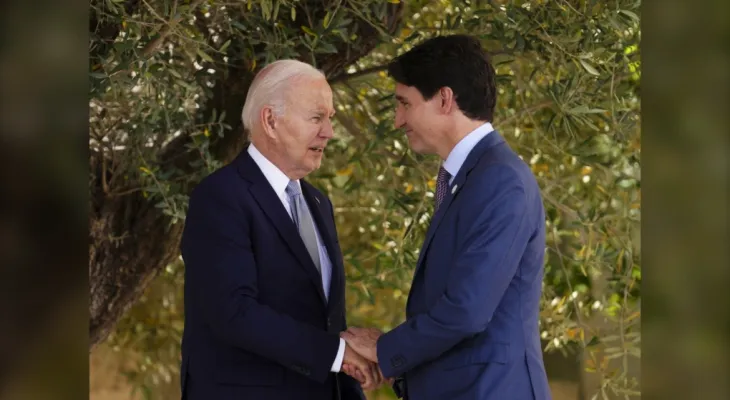Search here
Newspaper
Search here

Arab Canada News
News

Published: July 13, 2024
As the U.S. elections approach, we are monitoring the potential impacts on the bilateral relations between Canada and the United States.
Canada has long faced criticism from the United States and other allies for failing to meet NATO's defense spending target, which directs coalition members to contribute at least 2 percent of their GDP to defense.
After a barrage of criticism from NATO allies, Prime Minister Justin Trudeau said this week that Canada will reach this benchmark - but that will not happen until 2032 and he provided little detail regarding the timeline.
Although both Republicans and Democrats have long complained about Canada’s slow military spending, experts say Canada is likely to suffer consequences under a second Trump presidency, which may also end U.S. support for Ukraine.
Aaron Ettinger, an Associate Professor of Political Science at Carleton University specializing in U.S. foreign policy, said, "U.S. presidents have complained about defense spending in Canada since the end of World War II, and Canadian leaders have long tried to address the criticisms."
Ettinger added to CTVNews.CA, "Biden may be more lenient as long as Canada continues to contribute to multilateral operations in Eastern Europe, including providing military aid to Ukraine."
"As for Trump, he will return to his pattern of berating Canada for not spending enough on defense, putting the Canadian Prime Minister in a difficult position: spending more on defense brings no political benefits in Canada, and anything Canada spends won't be enough for Trump."
Whether Trudeau’s promise to reach the 2 percent benchmark in eight years will change the U.S. perception of Canada - in Biden's eyes, or Trump if he wins the election in November - remains up in the air as just a promise.
Canada spent an estimated 1.38 percent of its GDP on defense in 2023, according to NATO data, placing it 25th out of 30 members.
During a rally in February 2024, former U.S. President Donald Trump recounted telling the NATO leader that he would allow Russia to access members who do not meet the minimum defense spending in the military alliance.
Trump told his supporters, "No, I will not protect you, in fact, I encourage them to do whatever they want," adding, "You have to pay. You have to pay your bills."
Trump reportedly considered withdrawing the United States from NATO, with rumors that he was contemplating establishing a two-tier military alliance where countries that fail to meet the spending target would not be protected.
Trump's national security adviser and retired lieutenant general Keith Kellogg told Reuters in February, "If you're going to be part of an alliance, contribute to the alliance, and be part of the alliance. If President Trump is re-elected, once the elections are over, I will give everyone what we call a warning order."
Former national security adviser to Trump John Bolton previously stated that Trump "never saw NATO as important" and "would try to get out" if re-elected. Trump reportedly considered doing this in 2018.
Ettinger told CTVNews.CA, "The big fear is that Trump will use allies as an excuse to withdraw from key multilateral security initiatives. This includes NATO, but it may also mean bilateral security arrangements with Canada."
According to Ettinger, a Trump victory could also affect Western support for Ukraine in its war with Russia.
Ettinger said, "If Trump is elected, there is a good chance to stop sending money to Ukraine. If that happens, likely every other country will follow suit. This is exactly what happened in Afghanistan: the U.S. withdrew, and every other Western country that was part of NATO operations did the same."
The message regarding defense spending in Canada has been similar - but softer - from President Joe Biden's team.
The current U.S. ambassador to NATO, Julianne Smith, told CTV's question period earlier this year, "Over the last ten years, we have gone from three countries aligning on this goal to 18, with more to come, and those that do not meet it now have a plan to get there, except for Canada."
Western support for Ukraine is also expected to continue under Biden.
He said, "If Biden is elected, the U.S. support program is likely to continue on its current slow upward trajectory."
Canada's defense spending
While only 11 countries met NATO's defense spending target in 2023 - led by Poland, the U.S., and Greece - more than 20 countries are expected to meet the target this year, excluding Canada.
While the Liberal government has not provided details on how it will reach the 2 percent target by 2032 aside from investments in new defense capabilities, including submarines, it has announced billions in new military spending that will see Canada reach 1.76 percent by 2029.
In April 2023, The Washington Post reported on a leaked Pentagon document which claimed that Trudeau told NATO staff privately that Canada would not meet the 2 percent target.
After being urged by a group of U.S. senators recently to increase defense spending, Trudeau said, "We recognize there is more to be done, and we will be there to do it."
When Canada committed to reaching the target by 2032, Trudeau also defended Canada’s defense contributions and seemed to be succeeding in the benchmark set by NATO.
Trudeau said at the NATO annual summit in Washington on Thursday, "We are constantly escalating and hitting hard, which is not always reflected in the analytical arithmetic where some people turn around very quickly. And that is why we are always asked about the 2 percent target as the end-all be-all to assess contributions to NATO."
Comments